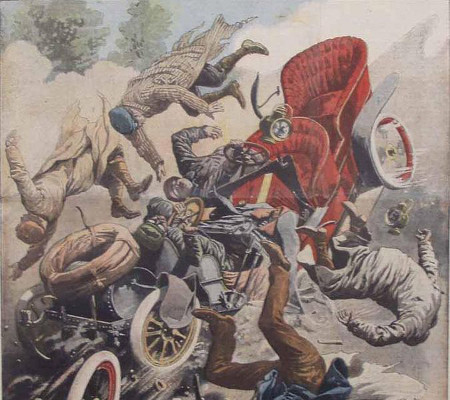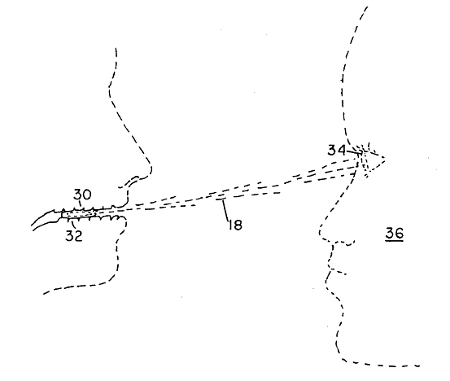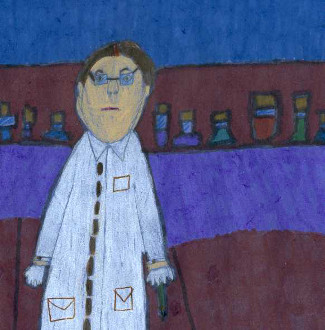A jester being on his death-bed, one of his companions begged when he got to the other world, he would put in a good word for him. ‘I may perhaps forget,’ said he; ‘tie a string about my finger.’
— The Laughing Philosopher, 1825
A jester being on his death-bed, one of his companions begged when he got to the other world, he would put in a good word for him. ‘I may perhaps forget,’ said he; ‘tie a string about my finger.’
— The Laughing Philosopher, 1825

En route to Senegal in 1816, the French frigate Méduse ran aground on a reef. The six boats were quickly filled, so those who remained lashed together a raft from topmasts, yards, and planks, and 147 people crowded onto a space 65 feet long and 23 wide, hoping to be towed to the African coast 50 miles away. (Seventeen crew and passengers remained aboard the Méduse.)
The raft sank 3 feet under their combined weight, and the tow line quickly parted. Rather than try to rescue them, the boats sailed on to the Senegalese capital. On the first night, 20 men drowned. On the second, some soldiers broke open a cask of wine and mutinied; in the ensuing melee, at least 60 were killed. By the following afternoon, the 67 who remained were gnawing sword belts to reduce their hunger. Eventually they descended on a corpse embedded among the logs of the raft. “We shudder with horror on finding ourselves under the necessity of recording that which we put into practice,” one wrote later.
On the fourth day, 48 remained, and that night a second mutiny killed 18 more. By the seventh day their numbers had dropped to 27 and they decided that their provisions would support only 15, so the 12 weakest were thrown to the sharks. The last 15 survived for 13 miserable days, living on garlic cloves, a lemon, and occasionally a flying fish. They were finally spotted by the brig Argus, a moment immortalized by Théodore Géricault (below).
Of the 17 who had remained aboard the Méduse, three survived. One told his story to a survivor of the raft journey, who wrote, “They lived in separate corners of the wreck, which they never quitted but to look for food, and this latterly consisted only of tallow and a little bacon. If, on these occasions, they accidentally met, they used to run at each other with drawn knives.”
For all this, the captain of the Méduse was imprisoned for only three years, an occasion for lasting controversy in French politics. “It is more difficult to escape from the injustice of man,” wrote one commentator, “than the fury of the sea.”

impavid
adj. fearless
There was a young fellow named Weir
Who hadn’t an atom of fear;
He indulged a desire
To touch a live wire,
(‘Most any old line will do here!)
— Anonymous, quoted in Carolyn Wells’ Book of American Limericks, 1925

Some insurance policies declare themselves inapplicable to injuries or losses that are covered by other policies. What happens if an injured person holds two such policies?
If the provisions are interpreted strictly, “then each would become inapplicable,” notes Earlham College philosopher Peter Suber. “But as soon as they were inapplicable, they would each trigger the other’s applicability again, and so on.”
“The policy-holder would either be entitled to nothing or to benefits from at least one policy, to be determined by an unending and indeterminable oscillation of liability.”
As airplanes began to populate the skies over Europe and America, they met an unexpected adversary — eagles. “Some of the adventures of aviators with eagles have been harrowing in the extreme,” reported the Associated Press in 1928. “An airplane was flying over the mountains [behind Athens] recently when several eagles swooped down and attacked it simultaneously. Their dashes at the machine so crippled it that the pilot was forced to descend quickly, and landed so badly that he and a passenger were injured.”
In Adventures With a Texas Naturalist (1975), Roy Bedichek reports that such encounters were reported as early as World War I and were still taking place 60 years later. He writes that pilot J.O. Casparis was flying over Texas’ Big Bend National Park when “an enormous eagle crash-dived his plane before he could shoot, tore through the window, ripped off several feet of the fuselage and showered him with shattered glass.” And J. Wentworth Day reported an attack by two eagles on a three-motored, all-steel passenger plane near Allahbad, India: “The first eagle flew straight in the middle engine, while the second dived from ten thousand feet, and went through the steel wing like a stone, ripping a great hole.”
Bedichek writes that, after the first attacks, the French army seriously considered training eagles to attack enemy planes, and the British Air Ministry issued instructions on the best tactics to pursue during eagle attacks. “Of course, modern planes have little to fear from eagles or other birds individually,” he notes, “but the encountering by plane of migration flights, especially of flights of large birds in considerable number, is said still to offer a considerable hazard.”

Paul Martineau came up with a novel self-defense method in 1990 — a wax capsule containing a concentrated solution of citric acid. If an assailant approaches you, you chew the capsule and spit the contents into his eyes.
Compared to other attack prevention methods, Martineau says, this one is “readily concealed, quick to use and … while effective, is not offensive to the user.”
From the Western Jurist, November 1878:
Two cousins, each claiming that the other was indebted to him, were in court litigating the matter. During the trial, a member of the bar, possessing a somewhat poetical turn of mind, composed the following lines on the merits of the case:
If the strife in this case is extremely perverse,
‘Tis because ’tis between a couple of ‘Kerrs.’
Each Owen is owin’ — but here lies the bother;
To determine which Owen is owin’ the other.
Each Owen swears Owen to Owen is owin’,
And each alike certain, dog-matic, and knowin’;
But ’tis hoped that the jury will not be deterred
From finding which ‘Kerr’ the true debt has incurred;
Thus settling which Owen by owin’ has failed,
And that justice ‘twixt curs has not been curtailed.
Let’s play a coin-flipping game. At stake is half the money in my pocket. If the coin comes up heads, you pay me that amount; if it comes up tails, I pay you.
Initially this looks like a bad deal for me. If the coin is fair, then on average we should expect equal numbers of heads and tails, and I’ll lose money steadily. Suppose I start with $100. If we flip heads and then tails, my bankroll will rise to $150 but then drop to $75. If we flip tails and then heads, then it will drop to $50 and then rise to $75. Either way, I’ve lost a quarter of my money after the first two flips.
Strangely, though, the game is fair: In the long run my winnings will exactly offset my losses. How can this be?

“If an elderly but distinguished scientist says that something is possible he is almost certainly right, but if he says that it is impossible he is very probably wrong.” — Arthur C. Clarke
“When, however, the lay public rallies around an idea that is denounced by distinguished but elderly scientists and supports that idea with great fervor and emotion — the distinguished but elderly scientists are then, after all, probably right.” — Isaac Asimov
On Monday last an accident of a singular but distressing nature happened to one of our townsmen. A pair of fanners were being conveyed in a cart along the road to the Whins, when, from some cause or other, the horse ran off. Mr. Drummond, millwright, the person who has met with the accident, at first stepped forward to stop the horse, but, fearing danger, started hastily back. Behind Mr. Drummond was a lad bearing an axe upon his shoulder. Upon the sharp edge of the instrument Mr. Drummond unfortunately ran, and the consequence was that his nose was very nearly cut off. So complete was the cut the nose fell over upon the mouth, and was suspended by the slightest portion of the integument. Mr Drummond instantly applied his handkerchief to his face, and proceeded to Dr. Brotherston, who was fortunately in his own house at the moment. As may be supposed, the sight was a hideous one, the accident presenting an insight into the interior of the face. We are happy to say that, under Dr. Brotherston’s judicious treatment, the nose has been replaced, and there is every hope of the cure being so effectual that scarcely any trace of the accident will by and by be visible.
— Alloa Advertiser, reprinted in the Times, Dec. 18, 1855